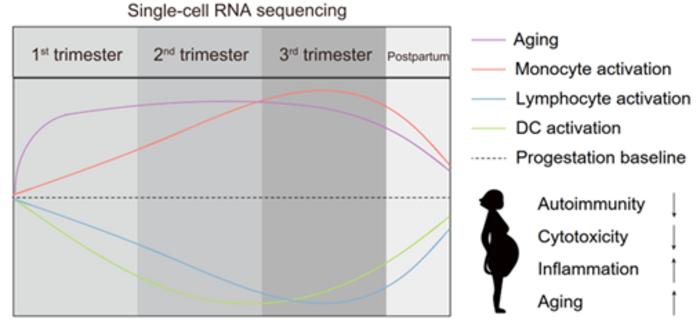
Pregnancy represents a remarkable period characterized by significant immunological changes that are critical for fetal development and maternal health. A recent study conducted by a team of researchers led by Professors Wenru Su and Xianggui Wang has shed light on these intricate immune adaptations using cutting-edge single-cell RNA sequencing (scRNA-seq) techniques. This research aims to provide a comprehensive understanding of how pregnancy alters immune dynamics, which in turn may influence maternal susceptibility to various diseases.
At its core, pregnancy initiates a complex interplay of immune responses designed to balance the need for fetal tolerance with the mother’s need to maintain a robust defense against pathogens. Throughout this period, women’s immune systems undergo transitional phases marked by shifts in immune cell populations and functions. While it is well-established that pregnancy can predispose women to certain infections, it also appears to confer a degree of protection against autoimmune diseases, suggesting a dualistic nature to the immune adaptations encountered during this time.
Previous models investigating maternal immunity have often overlooked the fluid dynamics of immune changes that occur at different stages of pregnancy. The researchers’ innovative approach not only addresses this oversight but also emphasizes the importance of considering the temporal variations of immune functions. By analyzing peripheral blood immune cells from pregnant women at various stages, the study delineated how immune system behavior changes both during and after pregnancy, unveiling new insights that could have substantial impacts on maternal health strategies.
According to Prof. Su, the scRNA-seq technology enabled the creation of a high-resolution immune map that delineated maternal immune changes with unprecedented detail. Their findings underscore a noteworthy decline in the adaptive immune response during pregnancy, especially in the context of T and B cell functions. Even more strikingly, there is a documented activation of monocytes which serves as a compensatory response to the diminishing adaptive immunity, a phenomenon that reveals the adaptive strategies employed by the mother’s immune system.
The study has also revealed nuances in the immune responses as pregnancy progresses. In the late stages, a transition from immune suppression to activation can be observed, highlighting a potential physiological mechanism that may contribute to the onset of labor and delivery. Given that labor marks a critical transition, understanding these dynamics could pave the way for interventions that enhance maternal and fetal outcomes.
Key findings from the research elucidate three major aspects of immune adaptations during pregnancy. The first discovery pertains to the suppression of adaptive immunity where a notable decline in cytotoxic activity occurs within CD8+ T cells and natural killer (NK) cells. This decline is particularly pronounced in late pregnancy, showcasing the body’s recalibration to prioritize fetal health over maternal immune defenses during this crucial period.
The second critical finding centers on the increased activation of monocytes, which exhibit heightened expression of pro-inflammatory genes. This suggests that as adaptive responses wane, a compensatory inflammatory response emerges, possibly facilitating the physiological changes associated with late pregnancy. The activation of monocytes, predominantly through IL-1 signaling, aligns with the inflammatory state that often accompanies the final trimester of pregnancy.
The third facet involves the concept of immune aging that appears to be exacerbated during pregnancy. This phenomenon is marked by increased oxidative stress levels and enhanced expression of senescence markers such as CDKN1A and STAT3 within monocytes and NK cells. The study indicates that while such changes may signal immune aging during pregnancy, they are not irreversible, with some alterations showing a tendency to reverse after childbirth.
This research not only establishes a foundational understanding of maternal immune dynamics but also sets the stage for potential therapeutic approaches aimed at mitigating postpartum recovery challenges. Observations about increased monocyte activity in late pregnancy may offer predictive insights into birth outcomes, providing a new framework for anticipating complications or facilitating healthier deliveries in the clinical landscape.
Pregnancy and childbirth are pivotal moments for many women, often accompanied by intense physical and emotional experiences. However, the intersection of maternal health and immune system dynamics has received attention only recently. By elucidating these immune transitions, the study opens new avenues for thinking about how maternal health can be optimized during and after pregnancy, reinforcing the idea that a woman’s health journey does not end with delivery.
In conclusion, the findings from the study highlight the necessity of a nuanced understanding of the immune system’s adaptations during pregnancy. With future investigations into therapeutic strategies to support maternal immunity and health, we stand on the cusp of a new horizon in prenatal and postnatal care that prioritizes both maternal and fetal well-being. As the world continues to grapple with the implications of immune responses amidst health challenges, this study offers a beacon of hope, bridging knowledge with application.
Subject of Research: Immunological changes during pregnancy
Article Title: A dynamic peripheral immune landscape during human pregnancy
News Publication Date: October 2023
Web References: DOI link
References: Liu X, Zhu L, Huang Z, Wang X, Su W et al.
Image Credits: Liu X, Zhu L, Huang Z, Wang X, Su W, et al.
Keywords: Pregnancy, Immune System, Monocytes, Cytotoxicity, Adaptive Immunity, Immune Aging, Single-cell RNA Sequencing, Maternal Health, Autoimmune Diseases, Inflammation, Fetal Health, Therapeutic Strategies
Tags: autoimmune disease protection in pregnancyfetal tolerance immune adaptationsimmune cell population shifts during pregnancyimmune responses during gestationinnovative research on maternal immunitymaternal health immune dynamicsmaternal susceptibility to diseasespregnancy immune system changessingle-cell RNA sequencing pregnancytemporal variations in immune responsestransitional phases of maternal immunityunderstanding pregnancy immunology





